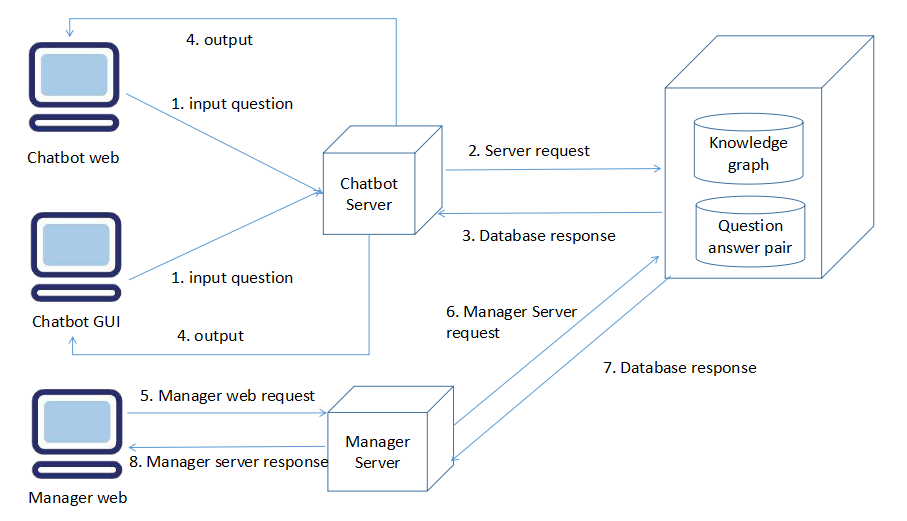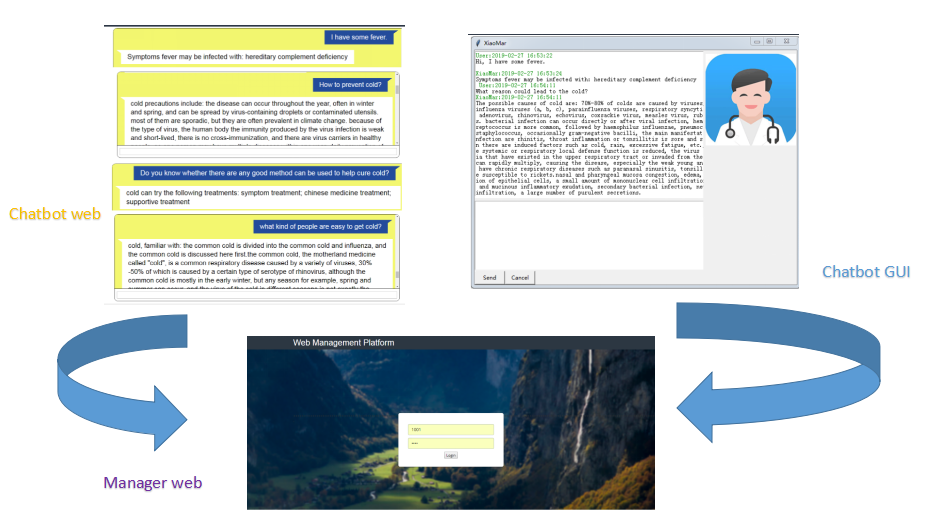The system can be divided into two parts. The first part is the knowledge graph question answering and the second part is if the knowledge graph cannot find the answer of the user inputted question, the second part will help to retrieve the top k most related answers by computing the medical question similarity from a medical question answer pair dataset.
Here are some useful reference links.
https://github.com/liuhuanyong/QASystemOnMedicalKG
The pre-train model will be used to load word embedding before training the BiLSTM+Attention model and HBAM model.
https://drive.google.com/file/d/0B7XkCwpI5KDYNlNUTTlSS21pQmM/edit?usp=sharing
https://www.medicinenet.com/medterms-medical-dictionary/article.htm
https://www.nhsinform.scot/illnesses-and-conditions/a-to-z
Model train_dev_test dataset are filter out the medical related questions from Quora question pair dataset.
https://data.quora.com/First-Quora-Dataset-Release-Question-Pairs
https://github.com/LasseRegin/medical-question-answer-data
The scale of knowledge graph about 700 diseases. For each disease, there exists symptom, accompany_disease, prevent_way, cure_way and totally 6 entities.
Medical Knowledge Graph Establish, GUI and website The main code is based on the following link. You need to run the build_medicalgraph.py to establish the knowledge graph before you use it. Then you may run GUI.py to run the GUI interface. You can also run chatbot_graph.py which will allow you to chat in command. You can also run server.py to start the website and chat. https://github.com/14H034160212/HHH-An-Online-Question-Answering-System-for-Medical-Questions/tree/master/Medical_knowledge_graph_establishment/MedicalKBQA
https://github.com/google-research/bert
https://github.com/likejazz/Siamese-LSTM
https://github.com/LuJunru/Sentences_Pair_Similarity_Calculation_Siamese_LSTM
https://github.com/uhauha2929/examples/blob/master/Hierarchical%20Attention%20Networks%20.ipynb
The total number of medical related data from Quora dataset is nearly 70000, but we randomly pick the 10000 as the (train/dev/test) dataset.
The number distribution of train: dev: test = 6:2:2
| Model | Average Eval_accuracy by three times | Range of change |
|---|---|---|
| BERT baseline model | 0.7686 | (-0.0073, +0.0057) |
| HBAM model | 0.8146 | (-0.0082, +0.0098) |
| Bi-LSTM + Attention model | 0.8043 | (-0.0103, +0.0062) |
conda create -n hhh python=3.6
conda activate hhh
git clone https://github.com/14H034160212/HHH-An-Online-Question-Answering-System-for-Medical-Questions.git
cd HHH-An-Online-Question-Answering-System-for-Medical-Questions
pip install -r requirements.txt[08/03/2023] We rewrite code for HBAM and MaLSTM using tensorflow 2.0+ and add tensorboard sentence embedding visualization under branch origin/tensorflow2.
Hierarchical attention networks for document classification
Siamese Recurrent Architectures for Learning Sentence Similarity
If you want more details about this project, watch our presentation recording, HHH Chatbot web and GUI, HHH web manager backend platform on YouTube.
@inproceedings{bao2020hhh,
title={HHH: An Online Medical Chatbot System based on Knowledge Graph and Hierarchical Bi-Directional Attention},
author={Bao, Qiming and Ni, Lin and Liu, Jiamou},
booktitle={Proceedings of the Australasian Computer Science Week Multiconference},
pages={1--10},
year={2020}
}
This research was supported by summer scholarship funding from the Precision Driven Health research partnership.






